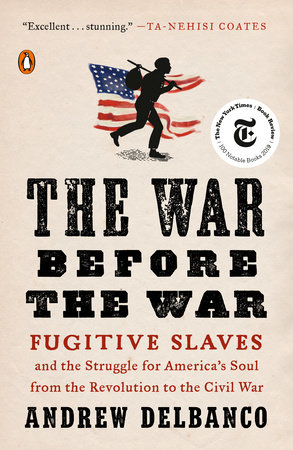A United States? Has it ever been truly thus? Well, yes, at times, depending on whom you ask. Was it united before the cataclysm of the Civil War and its aftermath prompted the crafting of a second American Constitution in the Thirteenth, Fourteenth, and Fifteenth Amendments—amounting to a second republic, out of the ashes of slavery and bloodshed? In The War Before the War, Andrew Delbanco replies with a determined no to the question of whether antebellum America had ever been truly united.
Delbanco, a distinguished literary historian, argues that, compared with all the other crises facing the young American republic, nothing produced an irresolvable “maelstrom of contradiction” more than the question of fugitive slaves. The existence of slavery was challenge enough to the integrity of the Union, but what crystalized its threat from the beginning was the clash between “feeling” and “duty,” between morality and law regarding what to do about escaping slaves. Did they belong to the slaveholders and therefore need to be retrieved and returned according to the laws governing private property, or were they to be treated as human beings exercising the same natural rights the founders had claimed as justification for their revolt against Britain?
Delbanco writes lyrically and with presentist passion about this basic American paradox, which threatened national comity for almost the first hundred years of the Union. “The fugitive slave story,” he contends, “is a rhyming story. It is impossible to follow it without hearing echoes in our own time.” But also, in his own personal way, he respects those in the middle, the compromisers like Webster who could never resolve this struggle on the country’s journey to national shipwreck. It might seem odd that moderates could be not only tragic losers but also flawed heroes. Compromise, once an honored American tradition for better or for worse (and it produced both), is no longer an esteemed political practice. Delbanco argues for respect for the “miserable centrists” of history (Isaiah Berlin’s phrase for certain of his cold war contemporaries), even as he chastises the hypocrisy of slaveholding advocates of liberty.
Delbanco also writes with a genuine sense of tragedy, and no small dose of indignation, about this story. The founders who crafted the Constitution had compromise “in their DNA.” Yet among the thirty-nine signers of the Constitution, nothing animated the interests of the many slaveholders from the South in their midst more than the right to retrieve their fugitive slave “property,” thus forcing concessions from Northern nonslaveholders. Delbanco contends that without the fugitive slave clause, as Article 4, Section 2, Clause 3 of the Constitution has become known, the whole document could not have been achieved in 1787. The founders’ complicity with slavery while they embraced “liberty” and created a republic is not quite what Delbanco calls the “compulsory question with no satisfactory answer.” The great historian Edmund Morgan concluded that these slaveholding republicans believed deeply in white liberty and black unfreedom, and as eighteenth-century landowners understood their own dire need for a permanent, dependent labor force to sustain their economic world. The awful contradiction within the inception of the American nation is not so mysterious when we examine its nexus of racism and greed.


